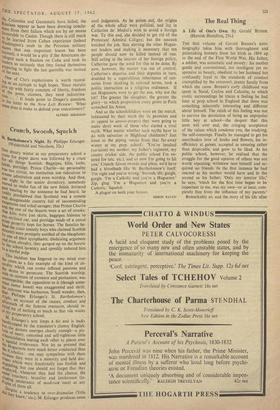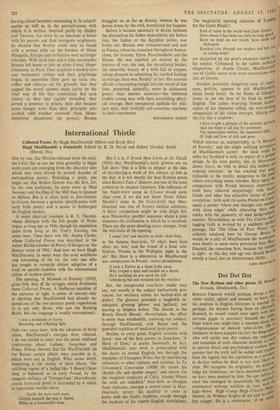The Real Thing
A Life of One's Own. By Gerald Brenan. (Hamish Hamilton, 25s.)
THE first volume of Gerald Brenan's auto- biography takes him with thoroughness and painstaking honesty from his birth in 1894 up to the end of the First World War. His father, a soldier, was autocratic and moody: his mother gentle and conventional, not intelligent yet re- sponsive to beauty, obedient to her husband but confusedly loyal to the standards of conduct exemplified by the extrovert, jaunty family from which she came. Brenan's early childhood was spent in Natal, Ceylon and Calcutta, to which exotic surroundings he traces a feeling he had later at prep school in England that there was something inherently interesting and different about himself. The relish of this feeling was not to survive the desolation of being an unpopular little boy at school—the despair that this term will• ever end, the cringing acceptance of the values which condemn you, the toadying, the self-contempt. Finally he managed to get his unorthodox love of books and flowers, his in- efficiency at games, accepted as amusing rather than despicable, and grew to be liked. At his public school, however, he realised that the struggle for the good opinion of others was not worth repeating, withdrew into himself and ac- quired no friends. In the first instance he had reacted as his mother would have and in the second as his father; 'Only my interior life,' he says, 'which for the first time began to be important to me, was my own—or at least, com- pletely free from the influence of my parents.'
RAVEN Remarkably so, and the story of his life after
leaving school becomes oustanding in its subjecf- matter as well as in the perceptiveness with which it is written. Inspired partly by Shelley and Thoreau, but more by an interlude at home with his parents and their bourgeois neighbours, he decided that Reality could only be found with a nomad tribe on the borders of Outer Mongolia. Europe and civilisation were no longer tolerable. With dyed hair and a false moustache, Brenan left home to join an older friend, Hope- Johnstone, in Paris. They acquired a donkey-cart and workmen's clothes and their pilgrimage began, its austerities (they gave up meat, tea, coffee and tobacco on the grounds that they sapped the moral system) made joyful by the 'real' way of life they symbolised. But such money as they had rapidly dwindled, they served a sentence in prison, their diet became more meagre even than their principles pre- scribed, cold weather overtook them. Hope- Johnstone abandoned the project; Brenan struggled on as far as Bosnia, whence he was driven home by the cold, humiliated but happier.
Before it became necessary to decide between the alternatives his father immediately put before him, the Indian or the Egyptian police, war broke out. Brenan was commissioned and sent to France, where he remained throughout Armen- tieres, the Somme, Ypres, Passchendaele and the Marne. He was repelled yet excited by the horrors of war, the rats, the decapitated bodies, the unearthly beauty of a field full of corpses, taking pleasure in submitting his rarefied feelings to outrage; here was 'Reality' at last. His account affords a fascinating insight into the mood of that time, preserved, naturally, more in adolescent poetry than mature memoirs—the sheltered erudite young men with their astonishing physi- cal courage, their unexpected aptitude for mili- tary duty, their zestfully self-conscious reactions to their experiences.
BERNARDINE BISHOP































 Previous page
Previous page